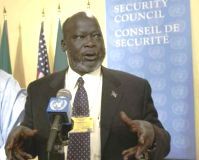Sudanese rebel: Civil-war peace deal a model for Darfur
By EDITH M. LEDERER, Associated Press Writer
UNITED NATIONS, Feb 8, 2005 (AP) — Southern Sudan’s rebel leader called Tuesday for the peace agreement ending the country’s 21-year civil war to serve as a basis to settle the devastating conflict in Darfur, backed by a 30,000-strong force to stabilize the vast western region.

|
|
John Garang, head of the main Sudanese rebel group, speaks after the United Nations Security Council met in New York to discuss the situation in the Darfur, February 8, 2005. (Reuters). |
John Garang, who spent 10 years negotiating an end to the civil war and will shortly become a vice president in a new Sudanese government of national unity, told the U.N. Security Council last month’s north-south agreement should also be used to end a long low-intensity conflict in eastern Sudan which recently flared up.
Garang said he was “encouraged” that the Jan. 9 peace agreement could be successfully applied in both Darfur and eastern Sudan as a result of talks he held with government leaders in the region and leaders of armed groups involved in both conflicts.
“I’m optimistic that the comprehensive peace agreement has now considerably improved prospects for a resolution of the Darfur conflict as well as that of eastern Sudan ,” he told an open council meeting.
As a first step, he called on the parties “to accept in principle and preferably even commit themselves before the United Nations Security Council to accept the comprehensive peace agreement as the basis for solving the conflicts in Darfur and eastern Sudan .”
Garang also suggested that the parties commit themselves to a deadline to reach agreement – just as the Sudanese government and his rebel Sudan People’s Liberation Movement did when the Security Council held a rare meeting in Nairobi in November.
“The parties could then negotiate the details on autonomy and self-government of these areas, on power-sharing, on wealth-sharing, and on security arrangements and the SPLM could assist them in working out these details,” Garang said.
On the military and security side, he renewed a suggestion for a 30,000-strong stabilization force for Darfur which he made to Secretary-General Kofi Annan in September, and which he said “makes even more sense” following the north-south agreement.
Garang proposed a force comprising 10,000 troops from the Sudanese government, 10,000 troops from his Sudan People’s Liberation Army, and 10,000 troops from the African Union, with international logistical support.
This would provide a “sufficiently neutral and robust force for security stabilization of Darfur and protection of civilians, and therefore creation of the necessary conducive environment for negotiations reaching a comprehensive peace agreement,” he said.
The African Union has deployed about 1,900 members of an expected 3,320-strong force. Annan has asked the Security Council to approve a 10,130-strong U.N. peacekeeping mission to enforce the north-south peace deal, but he has stressed that the Darfur crisis must be included.
Sudan’s first vice president, Ali Osman Mohammed Taha, who negotiated the north-south agreement with Garang, told the council a recent visit to Darfur convinced him even more “of the need to arrive at a political solution and end the war and alleviate the suffering.”
He assured the council of the government’s determination to end hostilities in Darfur “and declare 2005 the year for peace in Sudan , a comprehensive peace.”
Taha appealed to rich nations to be generous at a donor’s conference in Norway in April which will focus on reconstruction and development, saying this will enable the Sudanese people to “enjoy the peace dividend.”
He also called for trade restrictions and sanctions to be lifted and a complete write-off of Sudan ‘s debt to international institutions and states.
Security Council members have been informally discussing elements for a new resolution on the way forward in Sudan . It is also expected to take up last week’s report by a U.N.-appointed commission which found evidence of crimes against humanity and war crimes in Darfur, but stopped short of labeling the crisis genocide.
The resolution is expected to include Annan’s request for a peacekeeping mission but members are divided on how to punish those responsible for crimes in Darfur and on possible sanctions, including an arms or oil embargo.
